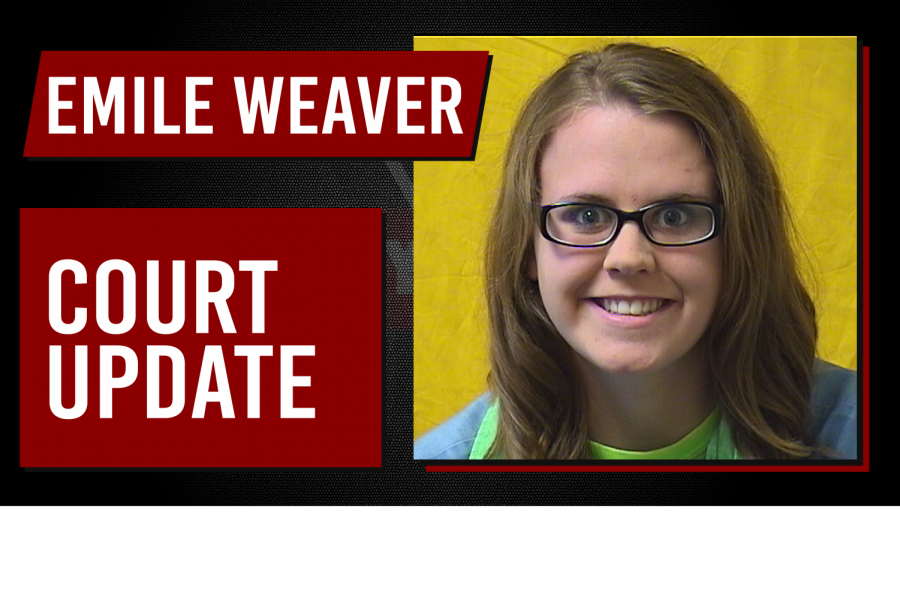New hearing recommended in Weaver case
June 28, 2018
The former Muskingum University student serving a life sentence for the murder of her newborn is now recommended for a new hearing after Ohio’s 5th District Court of Appeals reversed a previous decision last week.
Emile Weaver, 23, was convicted of aggravated murder, abuse of a corpse and two counts of tampering with evidence in June 2016 and was sentenced to life in prison without parole.
On April 22, 2015, Weaver gave birth to her daughter, Addison Grace Weaver, inside her sorority house bathroom. Court documents say Weaver delivered the baby into a toilet and later placed the newborn in a garbage bag with the placenta, paper towels and some of her own clothing.
It wasn’t until later that day when two of Weaver’s sorority sisters discovered the baby’s body in the garbage can outside the house.
A month after sentencing, Weaver motioned to appeal in the 5th District Court of Appeals, where the court’s decision was upheld in June 2017. An additional appeal with the Ohio Supreme Court was denied in February 2018.
When appealing to the supreme court, Weaver’s public defender, Nikki Baszynski, also filed for a separate post-conviction relief petition, asking for a new hearing based on claims that Weaver’s former legal counsel was “ineffective for failing to present evidence concerning neonaticide in mitigation sentencing” during the time of trial.
The petition was dismissed in September 2017 by Judge Mark Fleegle of the Muskingum County Common Pleas Court on grounds that her appeal did not qualify for hearing because it could have been argued during the direct appeal process.
Last week, that decision was reversed by the 5th District Court of Appeals, in which judges recommended a hearing at the trial court.
Attached to the petition was an affidavit written by Clara Lewis, an American Studies professor at Stanford University who studied Weaver’s trial transcript and docket, as well as read news reports and related social media posts from the time.

Upon review of the documents and after interviewing Weaver last August, Lewis found Weaver’s sentence to be “disproportionately harsh” when compared to sentencings in similar cases.
Lewis, an expert in sociology of law and social theory, who most recently began focusing her research on the social and cultural causes of neonaticide, concluded that Weaver’s case can be classified as contemporary neonaticide.
In the affidavit, Lewis wrote “Emile’s defense failed to present the factors that would have mitigated the severity of her sentence. Relevant information about the social and cultural causes of neonaticide that amount to mitigating circumstances were never introduced or properly considered.”
Lewis cited immaturity and social isolation as primary mitigating factors that could have been presented during trial but were not.
“Emile’s immaturity is evidenced by her attempt to receive both birth control and her pregnancy denial,” Lewis wrote.
Further, Lewis said Weaver’s attempt to obtain birth control, as detailed in trial, was an attempt to have a person in a position of authority to “take control and tell her what to do.”
Lewis argued that Weaver’s apparent pregnancy denial was “a sign of immaturity, not evil.”
Arguing social isolation, Lewis wrote that Weaver’s relationship with the father of her baby and her sorority sisters contributed to her pregnancy denial and social isolation, suggesting she had fostered underlying conditions of neonaticide. Furthermore, Lewis wrote that pregnancy denial is a socially co-created phenomenon.
She went on to cite examples brought up in trial that back her argument, pointing out text message conversations between Weaver and her ex-boyfriend, Logan Roberts.
Lewis said Roberts encouraged Weaver to keep her pregnancy a secret.
“These text messages speak to Logan’s active role in ensuring that Emile felt shamed for her condition and that she was isolated from the friends who could have helped her,” Lewis wrote.
Lewis also wrote that Weaver’s sorority sisters reinforced her “fiction” by going along with it through daily interactions.
“Even though she had a visible baby bump by the end of her pregnancy, they never pressed her to confront the truth and continued to include her in activities and events that were inappropriate given her condition,” Lewis wrote.
Despite her arguments on behalf of Weaver, Lewis also wrote that “the loss of her newborn’s life is a tragedy for which Emile deserves to be punished.”
Lewis wrote that had existing research on neonaticide been used in Weaver’s defense during trial, perhaps it would have resulted in a lesser sentencing.
A hearing at the Muskingum County Common Pleas Court is pending.












Jeania Mace • Aug 26, 2020 at 7:35 pm
I personally know Emily and also have kids yes it was a tragic with that being said can’t no one ever feel the way she did she was alone and frightened Emily is a GREAT PERSON WITH A BIG HEART she had enough trama in her life and deserves a second chance. Everyone makes mistakes and no one is perfect. Regardless of her sentence she will always have to live with what had happened. Society is soquick to judge somebody who makes a mistake in their life but here you have child molesters out here raping kids and kidnapping kids and getting probation 7 days in jail where does that equal out at I’d Rather somebody make a mistake and learn from their mistakes and grow from them estate then to have to deal with my kid being raped and having them go through all the psychological problems yes you made a mistake but at the same time nobody knows where she was coming from you can’t walk in her shoes and say you understand cuz you can’t so society needs to stop being so judgmental and actually open their eyes and try to see the whole picture she’s a good-hearted person and she’s a great person should do anything for anybody she made a mistake let it go everybody deserves a second chance in all reality everybody makes mistakes every day it’s just a matter if you get caught think on that before you judge somebody if you was in a situation would you want somebody to judge you or would you want somebody to hear you out would you want to help that you deserve and the rehabilitation and to get better and to learn or would you rather just keep doing the same stupid s*** that you did.
Joseph • Feb 12, 2019 at 8:02 am
I don’t think anyone is saying she wasn’t wrong but the sentence was severe. Those girls must have had some trauma in this whole ordeal. I don’t doubt that.
To me the judge in this case sounds like an idiot and a right wing lunatic. There should be more logic to punishment and thought put in versus just jumping into determinations based on emotions. His sentencing speech felt like he had already determined guilt even before the trial started. Determining a person’s non-remorse on the usage of “I” and “my” is simply not good judgment. He fails as a lawyer and sadly a judge.
Our country isn’t learning to be smart. We are tied to useless beliefs that being tied to religion falsely.
K. Zimmerman • Jun 30, 2018 at 12:07 pm
Miss Weaver has pulled a real con job on Clara Lewis. I can assure you that Emile Weaver was neither immature/naive nor in denial when this happened. She knew exactly what she was doing. She scheduled an abortion, then didn’t go through with it. I believe her mind then became really disturbed. But she knew what she was doing and what she did.
Second, to insinuate that her sorority sisters should shoulder ANY of the blame is disgusting and inexcusable. One person and one person alone is responsible for that baby’s death and that is Emile Weaver. Clara Lewis owes those girls an apology. So does the writer of this article.
Those girls experienced a trauma that will affect them the rest of their lives. To put out an article placing blame on them just dredges up their trauma, puts undeserved renewed stress and anxiety on them. Most of them have finally started on the road to recovery! This is NOT helping.
I too think the sentence was harsh but Emile Weaver is the one and only person responsible for the death of her baby.PLEASE KEEP THAT IN MIND.
Ps…before everyone gets all pissy with me, I have a personal connection to this case and I was in the courtroom in the first day of the trial so